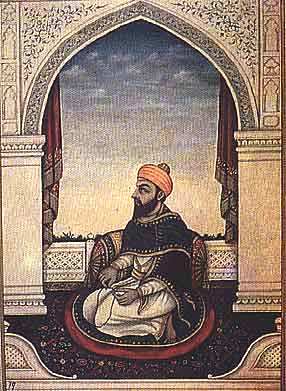Fakir Azizuddin
Fakir Azizuddin was a prominent figure in the court of Maharaja Ranjit Singh, the leader of the Sikh Empire in the early 19th century. He served as a diplomat and the foreign minister of the Sikh Empire, playing a crucial role in the negotiations between the Sikh Empire and the British East India Company, as well as other neighboring states.
Early Life[edit | edit source]
Fakir Azizuddin was born into a respected family of Fakirs, who were known for their spiritual and healing practices, in the late 18th century. His exact date of birth is not recorded. His family had a long-standing relationship with the ruling elites of Punjab, which later facilitated his entry into the court of Maharaja Ranjit Singh.
Career[edit | edit source]
Azizuddin's intelligence, diplomatic skills, and proficiency in several languages, including Persian (the court language of the time), Punjabi, and English, made him an invaluable asset to Maharaja Ranjit Singh. He was appointed as the head of the foreign affairs department of the Sikh Empire, a position he used to foster relations with the British, as well as with the Afghan and Persian empires.
One of his most notable achievements was his role in the drafting and negotiation of the Treaty of Amritsar (1809), which established the boundaries between the Sikh Empire and the British territories, ensuring peace between the two states for some time. Azizuddin's diplomatic acumen was also instrumental in managing the complex relationships with the Afghan Empire and the Persian Empire, navigating through the intricate politics of the region to secure the interests of the Sikh Empire.
Legacy[edit | edit source]
Fakir Azizuddin's legacy is marked by his contribution to the stability and expansion of the Sikh Empire during a period of significant upheaval and change in the Indian subcontinent. His diplomatic efforts helped in maintaining a balance of power in the region, preventing conflicts, and fostering peace through negotiation and dialogue.
His role as a diplomat also highlights the importance of diplomacy and communication in statecraft, especially in a multicultural and multi-lingual context like that of the 19th century Indian subcontinent. Azizuddin remains a respected figure in the history of Punjab and the Sikh Empire, remembered for his wisdom, diplomatic skills, and service to his state.
Death[edit | edit source]
Details about Fakir Azizuddin's death, including the date and place, are not well-documented. However, his contributions to the Sikh Empire and the region's history have left an enduring legacy.
Search WikiMD
Ad.Tired of being Overweight? Try W8MD's physician weight loss program.
Semaglutide (Ozempic / Wegovy and Tirzepatide (Mounjaro / Zepbound) available.
Advertise on WikiMD
|
WikiMD's Wellness Encyclopedia |
| Let Food Be Thy Medicine Medicine Thy Food - Hippocrates |
Translate this page: - East Asian
中文,
日本,
한국어,
South Asian
हिन्दी,
தமிழ்,
తెలుగు,
Urdu,
ಕನ್ನಡ,
Southeast Asian
Indonesian,
Vietnamese,
Thai,
မြန်မာဘာသာ,
বাংলা
European
español,
Deutsch,
français,
Greek,
português do Brasil,
polski,
română,
русский,
Nederlands,
norsk,
svenska,
suomi,
Italian
Middle Eastern & African
عربى,
Turkish,
Persian,
Hebrew,
Afrikaans,
isiZulu,
Kiswahili,
Other
Bulgarian,
Hungarian,
Czech,
Swedish,
മലയാളം,
मराठी,
ਪੰਜਾਬੀ,
ગુજરાતી,
Portuguese,
Ukrainian
Medical Disclaimer: WikiMD is not a substitute for professional medical advice. The information on WikiMD is provided as an information resource only, may be incorrect, outdated or misleading, and is not to be used or relied on for any diagnostic or treatment purposes. Please consult your health care provider before making any healthcare decisions or for guidance about a specific medical condition. WikiMD expressly disclaims responsibility, and shall have no liability, for any damages, loss, injury, or liability whatsoever suffered as a result of your reliance on the information contained in this site. By visiting this site you agree to the foregoing terms and conditions, which may from time to time be changed or supplemented by WikiMD. If you do not agree to the foregoing terms and conditions, you should not enter or use this site. See full disclaimer.
Credits:Most images are courtesy of Wikimedia commons, and templates, categories Wikipedia, licensed under CC BY SA or similar.
Contributors: Prab R. Tumpati, MD

